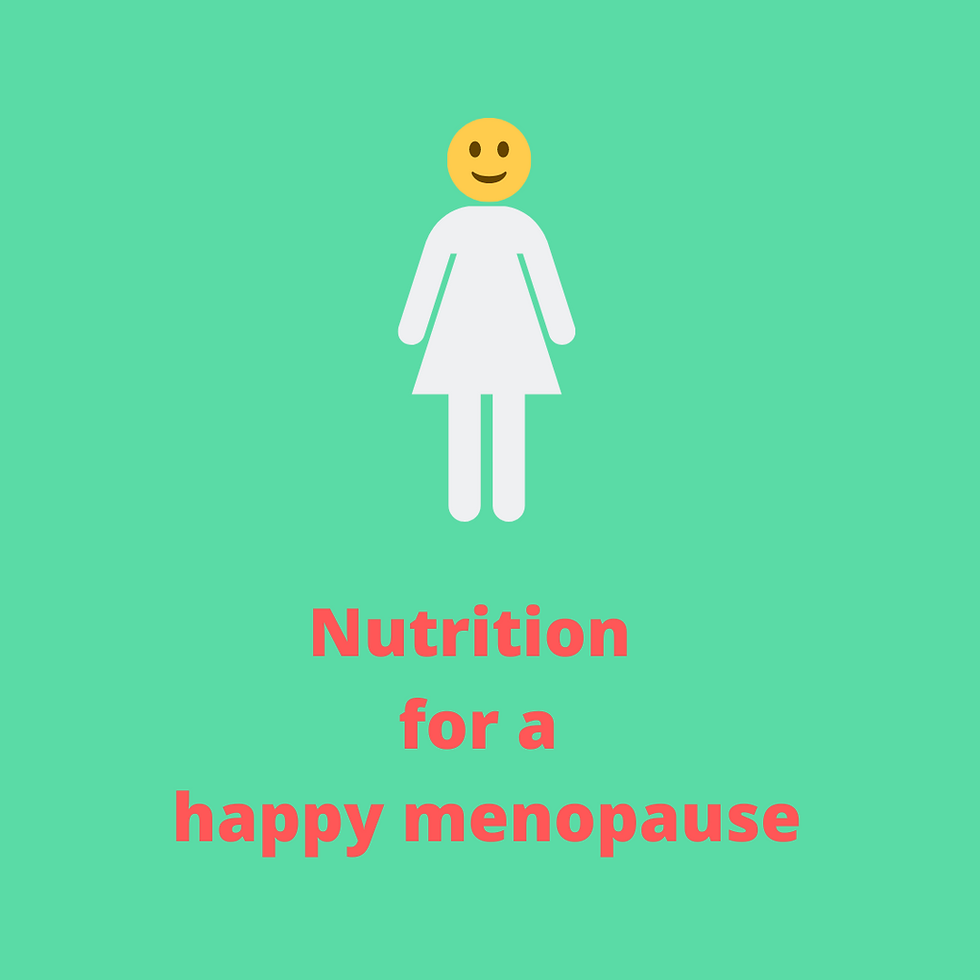Nutrition for a Happy Menopause
- Balanced you nutrition
- Jun 18, 2020
- 3 min read
Updated: Jun 20, 2020

Many women have been left wondering when they will be able to receive their next prescription of hormone replacement therapy (HRT) after ongoing manufacturing and supply issues in the UK. According to the British Menopause Society (BMS) the situation is temporary and GP’s can prescribe equivalent medication for now, but the lockdown situation has added to concerns.
In the interim, women who are concerned about the current shortages of HRT and their menopausal symptoms may be interested to explore the benefits of nutrition and lifestyle medicine, which can help to ease peri-menopausal and menopausal symptoms and improve long-term health.
What Is The Menopause?
The menopause occurs in women as a result of a change in hormone levels in the body, involving the decline of oestrogen and progesterone, resulting in the end of periods and no longer being able to become pregnant naturally. It is a natural stage in a woman’s life, but can result in symptoms such as night sweats, hot flushes, fatigue and low mood.
Hormone Replacement Therapy (HRT)
HRT is a pharmaceutical treatment prescribed by doctors to replace the hormones oestrogen and progesterone in order to bring relief from menopausal symptoms. First introduced in the 1930’s, for many women HRT provides relief and may also reduce the risk of osteoporosis. Unfortunately, as is the case with many pharmaceutical drugs, there are side effects, which include weight gain and anxiety and more worryingly some research suggests there is a greater risk of breast cancer and heart disease.
Nutritional Therapy – A Natural Treatment Choice
Nutritional therapists are trained to work with hormone imbalance and can recommend personalised protocols for both the women who prefer to approach the menopause using natural therapies and those that take HRT or bioidentical hormones (BHRT).
Nutritional therapists educate and empower individuals to feel better through food and lifestyle interventions. Compared to GP appointments, which last an average of just 10 minutes, clients have an hour to discuss their health issues during a structured case taking session. On the spot advice may be given, but generally recommendations are provided shortly afterwards by way of a protocol consisting of nutrition and lifestyle recommendations.
Practitioners spend many hours reviewing cases, seeking to get to the root cause of a problem. They draw on evidence-based research and employ analytical tools to identify the antecedents, drivers and triggers particular to an individual. Clients take away a personalised protocol including proposals covering diet, sleep, exercise, supplements, testing and lifestyle and are supported between appointments.
General Food Support
Phytoestrogens can contribute to all around symptom relief and foods rich in these compounds are commonly recommended in a menopause protocol. These include legumes (beans and lentils), seeds and organic soy which can be incorporated into everyday recipes e.g. dips, seeded bread, muffins, soup, burritos, casseroles and many more. To get the maximum benefit from these phytoestrogens it is also important to work on a clients gut health to ensure they have a healthy balance of gut bacteria to convert the phytoestrogens for therapeutic effect.
Common Menopausal Symptoms
Four of the more common menopausal issues can be supported by the following food and lifestyle recommendations:
Hot Flushes
Trigger foods for hot flushes and night sweats can include alcohol, caffeine and sugar and may need to be reduced through a weaning plan, with substitutions provided and support to deal with cravings. Nutritional therapists can also choose from a number of herbs including Red clover and Black Cohosh to help reduce hot flushes and night sweats.
Fatigue
Good levels of B vitamins are vital for keeping energy levels high and supplementing with a vitamin B complex may help boost vitality. Iron deficiency anaemia caused by low levels of iron may be suspected in women still menstruating in their peri-menopausal years and can be rectified with an iron supplement and nutrient rich foods such as lentils and dried apricots. Maca a Peruvian plant is a popular choice and has helped many women improve their vitality with the added benefit of boosting libido too.
Mood
Identifying nutritional deficiencies is a key focus for helping to improve mood and increasing foods containing high levels of magnesium e.g dark leafy greens and omega 3 e.g. oily fish can bring improvement. Herbs also play an important role with Agnus Castus being a popular choice for its balancing effect on hormones, especially during the peri-menopause.
Osteoporosis
Due to falling levels of the hormone oestrogen, bone density decreases sharply at the menopause, raising the risk of osteoporosis. Optimising vitamin K for bone strength and vitamin D for the effective absorption of calcium should be a key focus at this stage of life and a nutritional therapist will seek to measure blood levels. Walking and resistance training will commonly appear on protocols to support bone health.
Balanced you Nutrition regularly supports women experiencing or approaching the menopause through nutritional therapy. Contact Karen for more information either by telephone 07842150751 or email karen@balancedyounutrition.com

Comments